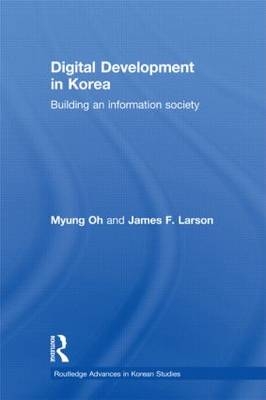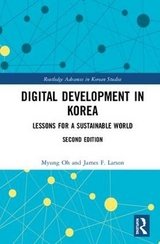
Digital Development in Korea
Routledge (Verlag)
978-0-415-60646-2 (ISBN)
- Titel erscheint in neuer Auflage
- Artikel merken
Oh and Larson describe the revolutionary developments of the 1980s including the TDX electronic switching system, a major surge forward in semiconductors, the start of privatization and color television and the thoroughgoing restructuring of Korea’s telecommunications sector. They further explore government leadership, the growing private sector and international trade pressures in the diffusion of broadband, mobile communication, and convergence toward a ubiquitous network society. The role of education in these developments is explored in detail, along with both the positive and negative aspects of Korea’s vibrant new digital media. The book also looks at Korea’s growing international involvement, its role in efforts to build a world information society, and finally, its future place in cyberspace.
This book will be of interest to students, scholars and policy makers interested in communications technologies, Asian/Korean Studies and development studies.
Dr. Myung Oh is a former Deputy Prime Minister and holds a Ph.D. in electrical engineering from Stony Brook University. As his writings, both published and unpublished, make abundantly clear, his scholarly interests embrace the social, cultural, economic and political implications of what has become possible through electrical engineering. Dr. Oh is a well-known and widely admired public figure in South Korea and internationally, mainly for the central leadership role he played in the nation’s information revolution beginning in the 1980s. More often than any other individual, he is acclaimed as the “godfather” of Korea’s telecommunications revolution. He served longer as a leader in the Ministry of Communications (Seven years and seven months as Vice-Minister and Minister during the 1980s) than anyone else in the history of that Ministry. Subsequently, he became Chairman of the 1993 Taejon International Expo, Minister of Construction and Transportation, and Minister of Science and Technology. The final position carried with it the designation of Deputy Prime Minister. James F. Larson came to Korea initially as a 23-year old American Peace Corps Volunteer. He taught English for two years at Kangwon National University, then returned to the United States, where he completed a Ph.D. in Communication at Stanford University in 1978. His next experience in Korea came as a senior Fulbright grantee, teaching and conducting research at Yonsei University in 1985-86. That led to a major research program on the Seoul Olympics and his book (with Park Heung Soo) on Global Television and the Politics of the Seoul Olympics. He met Dr. Oh Myung a few years after the Seoul Olympics, during the early stages of planning for the Taejon International Expo. That meeting led eventually to two years of research and the publication of The Telecommunications Revolution in Korea. James Larson’s research interests are strongly complementary to Dr. Oh’s, including television coverage of international affairs, its role with other new media in the modern Olympics, and the interplay of media, public opinion and foreign policy.
Foreword by Professor Eli Noam
Introduction
Chapter 1: Digital Development as Korea’s Destiny
Chapter 2: On the Shoulders of Giants: The 1980s Telecommunications Revolution in Korea
Chapter 3: Government-Led ICT Development in South Korea
Chapter 4: Korea’s Broadband Revolution
Chapter 5: The Mobile Revolution: Early Innovation and the "iPhone Shock"
Chapter 6: Intelligent Buildings, Sentient Cities and the Ubiquitous Network Society
Chapter 7: Education and Building Citizen Awareness
Chapter 8: Korea’s Information Culture and Media Ecology
Chapter 9: Innovation Nation: Korea in the Global Information Society
Chapter 10: Korea’s Place in Cyberspace
| Erscheint lt. Verlag | 9.3.2011 |
|---|---|
| Reihe/Serie | Routledge Advances in Korean Studies |
| Zusatzinfo | 14 Line drawings, black and white; 1 Halftones, black and white; 12 Tables, black and white |
| Verlagsort | London |
| Sprache | englisch |
| Maße | 156 x 234 mm |
| Gewicht | 544 g |
| Themenwelt | Schulbuch / Wörterbuch ► Wörterbuch / Fremdsprachen |
| Geisteswissenschaften ► Sprach- / Literaturwissenschaft ► Anglistik / Amerikanistik | |
| Geisteswissenschaften ► Sprach- / Literaturwissenschaft ► Literaturwissenschaft | |
| Geisteswissenschaften ► Sprach- / Literaturwissenschaft ► Sprachwissenschaft | |
| Mathematik / Informatik ► Informatik ► Grafik / Design | |
| Naturwissenschaften | |
| Sozialwissenschaften ► Kommunikation / Medien ► Medienwissenschaft | |
| ISBN-10 | 0-415-60646-2 / 0415606462 |
| ISBN-13 | 978-0-415-60646-2 / 9780415606462 |
| Zustand | Neuware |
| Informationen gemäß Produktsicherheitsverordnung (GPSR) | |
| Haben Sie eine Frage zum Produkt? |
aus dem Bereich



